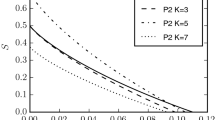Abstract
On the basis of entanglement swapping of Bell states, Hwang et al. proposed a probabilistic quantum key distribution (PQKD) protocol Quantum Inf. Comput. 11(7-8), 615–637 (2011). Recently, Lin et al. Quantum Inf. Comput. 14(9-10), 757–762 (2014) proposed a unitary operation attack on Hwang et al.’s PQKD. However, unlike the unitary operation attack, this work points out that a malicious participant in Hwang et al.’s PQKD protocol can manipulate the secret key. As a result, the security requirements of a PQKD protocol, i.e., fairness, cannot be satisfied in their protocol. Moreover, the same attack can also crack the fairness requirement of the existing quantum key agreement (QKA) protocols. To overcome both problems, this paper proposes a new PQKD protocol based on the order rearrangement of the transmitted photons. Furthermore, the rearrangement method can also solve the key manipulation attack in QKA protocols.
Similar content being viewed by others
References
Bennett, C.H., Brassard, G.: Quantum cryptography: Public key distribution and coin tossing. In: Proceedings of IEEE international conference on computers systems and signal processing (1984)
Bennett, C.H.: Quantum cryptography using any two nonorthogonal states. Phys. Rev. Lett. 68(21), 3121–3124 (1992)
Braunstein, S.L., Pirandola, S.: Side-channel-free quantum Key distribution. Phys. Rev. Lett. 108(13), 130502 (2012)
Chen, P., Li, Y.S., Deng, F.G., Long, G.L.: Measuring-basis encrypted quantum key distribution with four-state systems. Commun. Theor. Phys. 47(1), 49–52 (2007)
Deng, F.G., Long, G.L., Wang, Y., Xiao, L.: Increasing the efficiencies of random-choice-based quantum communication protocols with delayed measurement. Chinese Phys. Lett. 21(11), 2097–2100 (2004)
Ekert, A.K.: Quantum cryptography based on Bell’s theorem. Phys. Rev. Lett. 67(6), 661–663 (1991)
Gao, G.: Quantum key distribution by comparing Bell states. Opt. Commun. 281(4), 876–879 (2008)
Hwang, T., Hwang, C.C., Tsai, C.W.: Quantum key distribution protocol using dense coding of three-qubit W state. Eur. Phys. J. D. 61(3), 785–790 (2011)
Hwang, T., Lee, K.C.: EPR Quantum key distribution protocols with potential 100% qubit efficiency. Iet Inform. Secur. 1(1), 43–45 (2007)
Hwang, T., Lee, K.C., Li, C.M.: Provably secure three-party authenticated quantum key distribution protocols. IEEE T Depend Secure 4(1), 71–80 (2007)
Li, X.H., Deng, F.G., Zhou, H.Y.: Efficient quantum key distribution over a collective noise channel. Phys. Rev. A 78(2), 022321 (2008)
Li, X.H., Zhao, B.K., Sheng, Y.B., Deng, F.G., Zhou, H.Y.: Fault tolerant quantum key distribution based on quantum dense coding with collective noise. Int. J. Quant. Infor. 7(8), 1479–1489 (2009)
Li, X.-H., Duan, X.-J., Deng, F.-G., Zhou, H.-Y.: Error-Rejecting Bennett–Brassard–Mermin Quantum key distribution protocol based on linear optics over a Collective-Noise channel. Int. J. Quantum. Inf. 08(07), 1141–1151 (2010)
Long, G.L., Liu, X.S.: Theoretically efficient high-capacity quantum-key-distribution scheme. Phys. Rev. A 65(3), 032302 (2002)
Pirandola, S., Garcia-Patron, R., Braunstein, S.L., Lloyd, S.: Direct and rever se secret-key capacities of a quantum channel. Phys. Rev. Lett. 102(5), 050503 (2009)
Shih, H.C., Lee, K.C., Hwang, T.: New efficient Three-Party quantum key distribution protocols. IEEE J. Sel. Top Quant. 15(6), 1602–1606 (2009)
Yuan, H., Song, J., Han, L.F., Hou, K., Shi, S.H.: Improving the total efficiency of quantum key distribution by comparing Bell states. Opt. Commun. 281(18), 4803–4806 (2008)
Zhang, Z.J., Man, Z.X., Shi, S.H.: An efficient multiparty quantum key distribution scheme. Int. J. Quant. Infor. 3(3), 555–560 (2005)
Zhao, B.K., Sheng, Y.B., Deng, F.G., Zhang, F.S., Zhou, H.Y.: Stable and deterministic quantum key distribution based on differential phase shift. Int. J. Quantum Inf. 7(4), 739–745 (2009)
Lo, H.K., Chau, H.F.: Unconditional security of quantum key distribution over arbitrarily long distances. Science 283(5410), 2050–2056 (1999)
Shor, P.W., Preskill, J.: Simple proof of security of the BB84 quantum key distribution protocol. Phys. Rev. Lett. 85(2), 441–444 (2000)
Ben-Or, M., Horodecki, M., Leung, D.W., Mayers, D., Oppenheim, J.: The universal composable security of quantum key distribution. Theory of Cryptography Proceedings 3378, 386–406 (2005)
Zhou, N., Zeng, G., Xiong, J.: Quantum key agreement protocol. Electron Lett. 40(18), 1149–1150 (2004)
Chong, S.K., Hwang, T.: Quantum key agreement protocol based on BB84. Opt. Commun. 283(6), 1192–1195 (2010)
Chong, S.K., Tsai, C.W., Hwang, T.: Improvement on Quantum key agreement protocol with maximally entangled states. Int. J. Theor. Phys. 50(6), 1793–1802 (2011)
Shi, R.H., Zhong, H.: Multi-party quantum key agreement with bell states and bell measurements. Quantum Inf. Process 12(2), 921–932 (2013)
Liu, B., Gao, F., Huang, W., Wen, Q.Y.: Multiparty quantum key agreement with single particles. Quantum Inf. Process 12(4), 1797–1805 (2013)
Hwang, T., Tsai, C.W., Chong, S.K.: Probabilistic quantum key distribution. Quantum Inf. Comput. 11(7-8), 615–637 (2011)
Lin, T.-H., Yang, C.-W., Hwang, T.: Unitary operation attack and the improvement on probabilistic quantum key distribution. Quantum Inf. Comput. 14(9-10), 757–762 (2014)
Acknowledgments
This research was partially supported by the Ministry of Science and Technology, Taiwan, R.O.C., under the Contract No. MOST 106-2218-E-039-002-MY3, and also was partially supported by China Medical University under the Contract No. CMU106-N-07.
Author information
Authors and Affiliations
Corresponding author
Rights and permissions
About this article
Cite this article
Yang, CW. New Probabilistic Quantum Key Distribution Protocol. Int J Theor Phys 57, 3651–3657 (2018). https://doi.org/10.1007/s10773-018-3878-0
Received:
Accepted:
Published:
Issue Date:
DOI: https://doi.org/10.1007/s10773-018-3878-0




